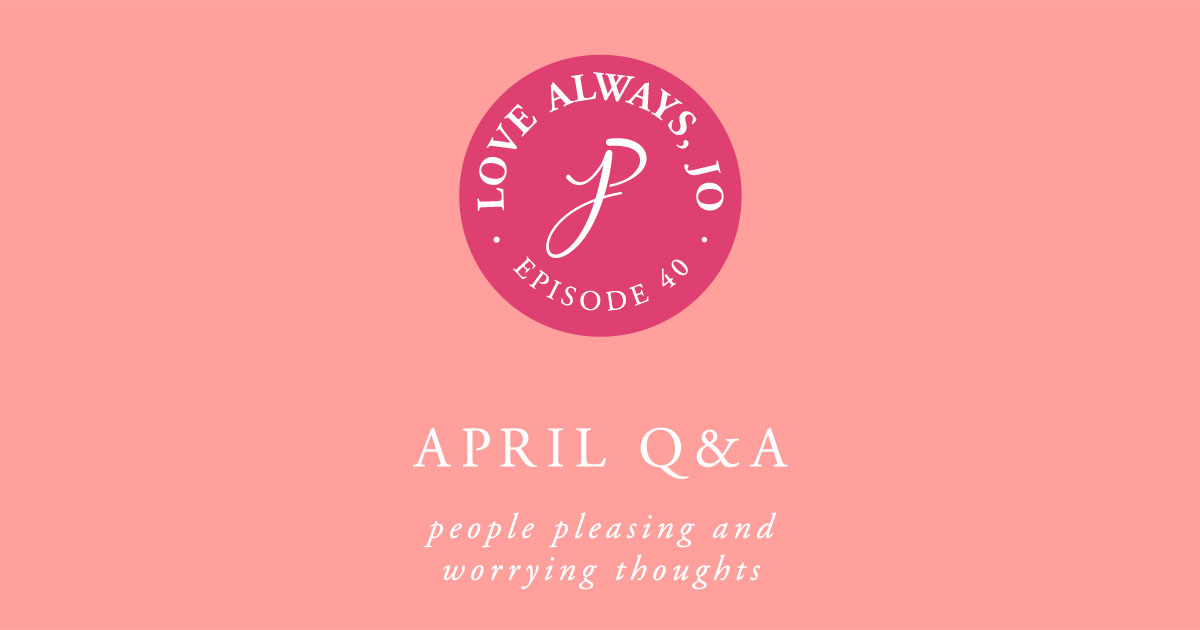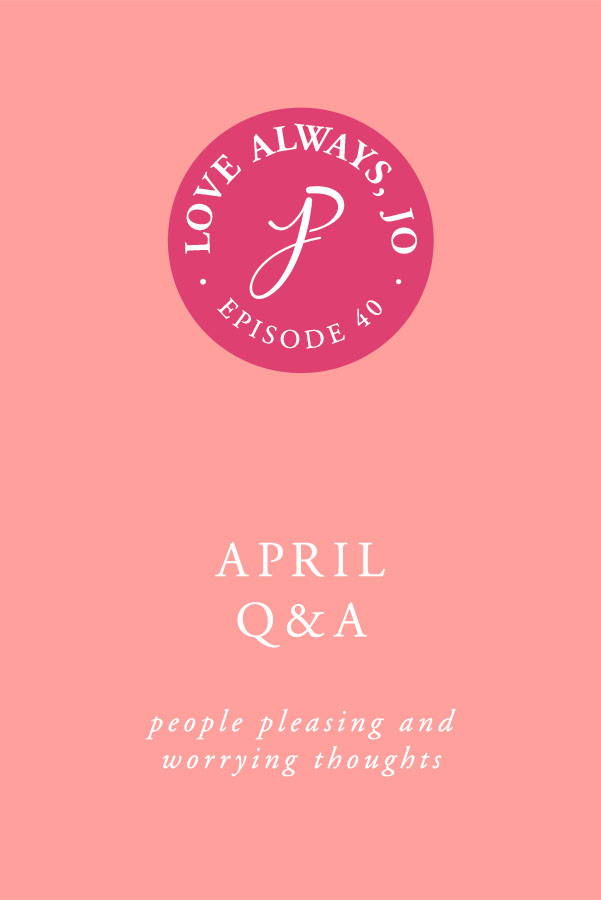This month’s Q&A questions come from a friend and from one of my coaching clients. In this episode of Love Always, Jo I’ll be answering questions about resources on people pleasing and worrying thoughts and anxiety.
Links:
- Daring to Rest Podcast
- Calm app
- Mini-Meditations Podcast
- Marketing in Yoga Pants – Addressing Your Inner Critic
- Balance Over Perfect – Episode 25 – Understanding Your Inner Critic
Recommended Books:
- The Disease to Please, Curing the People-Pleasing Syndrome
- Boundaries by Henry Cloud
- Become the most important person in the room by Rose Rosetree
Quotes:
- Start setting boundaries in your life
- Empaths have people-pleasing tendencies because they can feel other people’s energy like it’s their own
- Allow yourself time to process your day
Journal Prompts:
- Where might you need stronger boundaries?
- If you were to give your inner worrier a name, what would she be called?
Do you have any book recommendations about people pleasing?
A friend texted me this question recently and I thought it might be helpful for you too.
I replied: “You mean like this?” With a wink emoji and a picture of the book “The Disease to Please, Curing the People Pleasing Syndrome”
And then, for good measure, I added “Boundaries” by Henry Cloud.
People pleasing is an inner critic thing, and often people with an inner critic who wants them to focus on other people before themselves lack boundaries and it’s good to be reminded what boundaries are and how they can serve you.
I also added “Become the most important person in the room” by Rose Rosetree. This is a book for empaths. Empaths are people who can feel other people’s energy like it’s their own.
These three topics, people-pleasing, boundaries, and empaths are very closely related. Empaths have people-pleasing tendencies because they can feel other people’s energy like it’s their own. So, if they can make the people around them happy, they’ll feel happy, because the other person’s energy is merged with their own and it’s hard to tell the difference. But, after too much of this, you will get exhausted. Because even though it doesn’t feel like you have needs, you do. And you can only give so much, you can only take on so much of other people’s energy before your energetic bubble is ready to burst.
One way you can prevent this is by having boundaries. Both energetic boundaries where you keep your energy unmerged from other people’s and by having other boundaries…by stating what you need, what is and is not OK with you.
As empaths, our energies are outside ourselves, whereas non-empaths energies are focused more on themselves.
What small things can I do to just stop my brain from overthinking?
The second question came in an email from a coaching client who asked:
I’m visiting my parents for the next few days and my anxiety has been high. I went to bed thinking bad thoughts and woke up thinking bad thoughts. I think being home just makes things real for me and all the worries I can push away in D.C. come back when I’m home.
What small things can I do to just stop my brain from overthinking?
It’s very very common for anxiety and worry to come in when we slow down. When we’re busy we feel like we can outrun it (that’s why we stay addicted to busyness) and when we slow down, the worried thoughts come in big time. Some of my worst cases of anxiety have come on vacation. This doesn’t seem to make sense because we “should” be relaxed and enjoying ourselves.
I so get this. Some of my worst anxiety comes when I should be relaxing or having fun.
The worst anxiety I’ve had in my life…and I’ve had a LOT…came when my husband and I went on our first vacation after our honeymoon. We went to Nashville for a week and I could hardly enjoy myself I was so anxious. I remember we were riding bikes through a park and I literally had to stop and put my headphones in so I could listen to a podcast to distract myself. My inner critic was SO loud. It was like a broken record going through all the parts of my life where I was failing as a person, as a friend, as a sister. It felt awful. I was so embarrassed. I should’ve been having fun with my husband. I was miserable when I should’ve been enjoying riding a bike outside, feeling the wind in my hair and pedaling with joy. But I couldn’t.
Sometimes we use busyness to avoid being alone with our inner critic and anxiety. We tend to put so much on our plate so we don’t have to deal with our worries, which is why when we do slow down we get an onslaught of anxiety and inner critic thoughts.
I heard a great episode on the Daring to Rest podcast about dream deprivation and sleep, and he gave a great analogy. Planes fly above the weather. When they come down to land, they go through the weather and through the turbulence. Similarly, we fly above the weather as we’re going about our day and when we come down at night, relaxing/resting/watching tv/before bed, we go through the turbulence as our brain tries to digest and process all of the things we experienced that day. But we often don’t want to go through the turbulence. And that’s when things build up.
What you can do to avoid the onslaught of anxiety/worry when you’re trying to have fun
- Can you name your worrier? I like the term the article used “hyper-vigilant brain.” If you give the voice/thoughts a name it’s easier to identify and detach from the voice. You are not the voice, you are hearing the voice.
- Recognize that this is the normal process of your brain and it’s gotta run through this process to get back to its baseline. Try to detach from the thoughts. You don’t have to indulge the thoughts but you don’t have to push them away either. Fighting them will only make it worse/louder. Try imagining placing your thoughts on a cloud and let them float by, letting them go.
- Give your brain more time to process and rest. Try scheduling in time more regularly throughout the day for your brain to run through this process to make it a little more manageable. You can start with something as little as two minutes between meetings, 20 minutes at lunch to walk around the block, 3 minutes in the afternoon. Set a timer on your phone, like “OK brain…go ahead.” Work on doing this processing before you get in bed, that way when you go to bed you can actually go to bed without staying up going through these processes.
- Download the Calm app and do short meditations throughout the day. Here’s a podcast called Mini-Meditations that looks good.
Here are two podcast episodes I did about the inner critic that might be helpful too:
- Marketing in Yoga Pants – Addressing Your Inner Critic
- Balance Over Perfect – Episode 25 – Understanding Your Inner Critic
If you want to discuss how to prevent people pleasing or push past overthinking and anxiety or your inner critic, book a free discovery call with me at joannaplattcoaching.acuityscheduling.com.
Do you know someone who would appreciate this episode, or another Love Always, Jo episode? Send it her way.
Have a question for a future Q&A session? Follow me on Instagram and send me a DM or leave a comment on my next post when I put the call out for questions.
Podcast: Play in new window | Download


